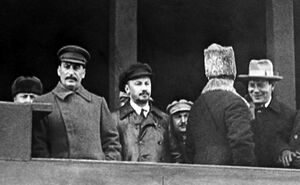Nikolai Bukharin: Difference between revisions
Jump to navigation
Jump to search
RedParabola (talk | contribs) m (Added the right stub template) |
RedParabola (talk | contribs) (Rewrote horribly biased article which cited exactly zero sources. If you revert this, please add usable citations.) |
||
| Line 1: | Line 1: | ||
[[File:Bukharin nikolai 1.jpg|thumb|Bukharin (center) standing with [[Iosif Stalin|Stalin]] in [[Red Square]] in 1929.]]{{POV|date=August 2023}} | [[File:Bukharin nikolai 1.jpg|thumb|Bukharin (center) standing with [[Iosif Stalin|Stalin]] in [[Red Square]] in 1929.]]{{POV|date=August 2023}} | ||
'''Nikolai Ivanovich Bukharin''' (9 October | '''Nikolai Ivanovich Bukharin''' (9 October 1888–15 March 1938) was an [[Old Bolshevik]] [[Russian Revolution|revolutionary]], [[Soviet Union|Soviet]] politician, [[Marxism|Marxist]] philosopher. He wrote multiple works which includes, with assistance [[Yevgeni Preobrazhensky]], the ''[[ABC of Communism]]''. | ||
After the [[October Revolution]], he initially became a member of a [[Left communism|left-communist]] opposition group with Preobrazhensky that supported Trotsky. During the [[New Economic Policy]], he became a figure in the [[Right-opposition (Soviet Union)|right-opposition]]. He formed an anti-party bloc with [[Alexei Rykov]] and [[Mikhail Tomsky]]. In early 1929, Bukharin confessed to Jules Humbert-Droz, a Swiss Social-Democrat and a friend, that the bloc was forced to resort to [[terrorism]] in order to remove Stalin for the lack of public or Party support.<ref>https://www.revolutionarydemocracy.org/rdv8n1/bukharin.htm</ref> | |||
==References== | ==References== | ||
Revision as of 21:27, 13 June 2024
The neutrality of this article is disputed. It may have a tendency-based slant, or may not incorporate all points of view on a subject. You can help by adding more perspectives. (August 2023) |
Nikolai Ivanovich Bukharin (9 October 1888–15 March 1938) was an Old Bolshevik revolutionary, Soviet politician, Marxist philosopher. He wrote multiple works which includes, with assistance Yevgeni Preobrazhensky, the ABC of Communism.
After the October Revolution, he initially became a member of a left-communist opposition group with Preobrazhensky that supported Trotsky. During the New Economic Policy, he became a figure in the right-opposition. He formed an anti-party bloc with Alexei Rykov and Mikhail Tomsky. In early 1929, Bukharin confessed to Jules Humbert-Droz, a Swiss Social-Democrat and a friend, that the bloc was forced to resort to terrorism in order to remove Stalin for the lack of public or Party support.[1]
